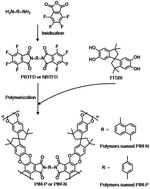Palladium catalyst imbedded in polymers of intrinsic microporosity for the Suzuki–Miyaura coupling reaction†
Abstract
Polymers of intrinsic microporosity (PIMs) are porous polymers with rigid ladder-type chain structures. Synthesizing these polymers usually involves the step polymerization of two types of monomer, namely, active fluorine-substituted aromatic ring monomers and phenolic monomers. Herein, we report a new PIMs preparation method using self-synthesized fluorinated monomers and common monomer 5,5′,6,6′-tetrahydroxy-3,3,3′,3′-tetramethyl spirobisindane. The fluorinated monomers were synthesized through the imidization of tetrafluorophthalic anhydride and aromatic diamines. The resulting PIMs served as a support for palladium, with the formed catalyst showing potential for application in the Suzuki–Miyaura coupling reaction.



 Please wait while we load your content...
Please wait while we load your content...